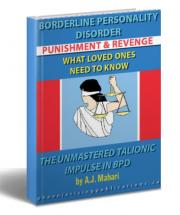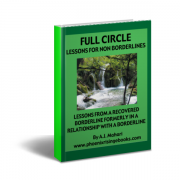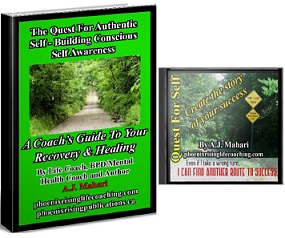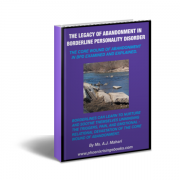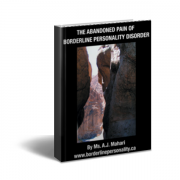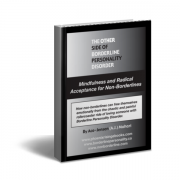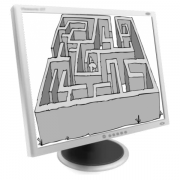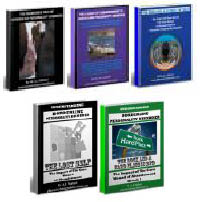![]()
Out of a Deeper Hunger
In this article I talk about the insatiable quality of unmet needs which are the deeper hunger that is the essence of Borderline Personality Disorder.
Borderline Personality Disorder (BPD) develops out of a deeper hunger. This deeper hunger is brought about by a proliferation of insatiability which has many causes. Borderlines have an initial deeper hunger because their needs in the developmental stages of life go unmet. This leads to what Rado (1956) termed as "affect hunger".
Affect is defined in the "Synopsis of Psychiatry" (sixth edition) as:
"the expression of emotion as observed by others.
Affect has outward manifestations that can be observed.
Affect can vary over time, in response to changing
emotional states."
1. Appropriate affect: the normal condition in which emotional
tone is in harmony with the accompanying idea, thought, or
speech; also further described as broad or full affect, in
which a full range of emotions is appropriately expressed.
2. Inappropriate affect: disharmony between the emotional
feeling tone and the idea, thought, or speech accompanying it.
Borderlines, not able to develop fully emotionally, often display an inappropriate affect. I know in my case, (in hindsight) when I was a young child it was only an inappropriate affect that I had mirrored and modeled to me by my mother. So, in my case, I developed this inappropriate affect, the deeper hunger, and the insatiability of this borderline "affect-hunger" as the result of not only having been sexually abused, but also as a result of not having my most basic nurture, and emotional needs met. The ambiguity that one experiences when one's primary care-givers fail to assist in one's "average" "healthy" emotional and psycho-social development are devastatingly long-lasting. Through my own experience with BPD I have come to the conclusion that it is these long-lasting effects that make up the definition of Borderline Personality Disorder.
Having said that, however, there comes a point where no matter what the cause of one developing BPD, it is the responsibility of each adult individual to heal and to take care of themselves. I no longer blame anyone for what happened to me. What happened to me happened. Victory and recovery lie in the letting go of blame, guilt and the like.
For the borderline affect is generally inappropriate and fleeting. It is reliant upon cognitive distortions, misperceptions, misinterpretations that all come about as the result of not knowing self well enough to know other. What we don't know about the world we often either devalue or objectify. Borderline affect is generated from the narcissistic need to satisfy unmet needs that feel as though they can not ever be satisfied. The borderline, often unbeknownst to his/herself is trying to navigate through adulthood with a child's notion of the world. Children as they develop, for a time, hold the view and belief that they are the center of the universe and that everything that happens in life has all to do with them. This is expected and even cute in a child, but it comes across to the non-borderline as neediness, helplessness, and a self-absorbed and demanding attitude when an "adult" relates from the distorted belief that they are the center of the universe.
Clearly borderlines develop a heightened sensitivity to perceived and interpreted "reality" as the result of this lack of nurture. "Borderline reality" is highly subjective. (I am not going to get into the nurture versus nature debate as there is not definitive answer. I do, however, believe more in the nurture aspects as the origin of BPD because, having healed them, I obviously did not change my biological make-up) Many borderlines have parents who would fit the criteria for being diagnosed borderline themselves. Many also have parents or primary care-givers, who in the initial stages of one's life manifest and mirror an inappropriate affect.
The proliferation of insatiability begins early and remains prevalent through the developmental stages of one's emotional maturity. Borderlines are emotional children inside of adult bodies who experience very crucial needs that go unmet in infancy, childhood and or adolescence. This is why a borderline reaches adulthood unable to be emotionally satisfied. There is often such a denial of the resultant psychic pain and or a dissociation from it that leaves most borderlines (until they seek help) suffering this angst-filled, screamingly-searing agony of insatiability. This is the deeper hunger. This deeper hunger of a life-time of unmet needs is the catalyst for the behaviour of the borderline. It is these unmet needs that are the seat of the rage, the anger, the push-pull, self-abuse/injury, and the black and white distorted thinking patterns. Over-ridden with psychic pain the roots of which are very real the borderline continues to desperately try any quick-fix. All efforts are designed to dull the ache of that deeper hunger. For me, my deeper hunger largely had to do with not having been held; not being soothed; and being told over and over again that I did not feel what I absolutely DID feel. This denial of my feelings throughout my development was one of the main causes of my not being able to emotionally mature. It skewed my reality. I sought solace in the reality of my parents or other relatives. It did not fit for me. Their collective reality was warped. They were very illogical thinkers. Therefore I always felt there was something wrong with me, with how I felt, what I thought, what I wanted, what I believed and needed. As it turns out, years later, I've come to realize that all I wanted and needed and sought and acted in and out about for so long had all to do with the legitimate (and healthy) need I had to have my needs met - PERIOD!
The borderline dilemma of being chronologically an adult while simultaneously being an emotional child sets one up to appear, to act, and to be, insatiable. The tragedy is that even with the role of this lack of nurture, and whatever other environmental factors one had to endure in the developmental stages of life, the borderline (once chronologically an adult and living on his/her own) then begins the entire of cycle of chronic deprivation (mainly emotional) using maladaptive patterns of behaving and relating (which are attempts to feed the affect-hunger) that see the borderline continue to choose to not take personal responsibility for meeting his/her unmet needs. I believe, in hindsight, the reason for this comes from a very deep sense of not being worthy enough to be held, to be soothed, to be loved, to be cared for and about, to be spoken to tenderly, to know a kind of emotionally-congruent consistency that one does not have any idea even exists as one grows up in the type of dysfunctional circumstance that breeds BPD.
Borderlines experience such a deep and profound affect-hunger. This affect-hunger leaves them insatiable. The dichotomy between what the borderline needs and what the borderline cannot tolerate deepens the borderline's already strong sense of ambivalence and leads to the push-pull behavior of "I hate you don't leave me". When I was borderline I wanted to be heard. When I was borderline I was too angry, hateful, and unwilling to extend enough trust to talk honestly about how I felt to anyone. When I was borderline I wanted to be understood. When I was borderline I didn't know who I was, so consequently I did not know how I felt and I was not able to understand myself.
When I was borderline I wanted to be held, loved and soothed. When I was borderline I could not let anyone touch me. I was too angry, too hurt and I could not cope with the vulnerability of being touched, hugged or held. When I was borderline no one could soothe me because I would not get close enough. No one could soothe me because all I put out there for them to "know" was false-self after false-self. When I was borderline I wanted someone to care. When I was borderline I was so incredibly ANGRY that I would abuse others (re-abuse myself through others) and myself to ensure the repeat of my past, where my needs would go unmet and I would not allow anyone to care about or for me. I felt to damaged, too unworthy. If things weren't familiar I would feel out of control. I was dissociated from my feelings in a major way. I thought I was protecting myself and fooling others but out of my deeper hunger I had really walled myself in further. I had trapped myself in my own borderline angst and that *WAS* hell! After all my faulty borderline black and white thinking made it clear to me that if my needs were reasonable or "normal" than my parents would have met them if they "really" loved me. And like a child, I believed for some time that because my parents didn't love me (in healthy ways that would have enabled me to thrive and grow) this meant that I was "unlovable".
Having been borderline I can now conclude that it was out of a deeper hunger that I was forced to try to protect myself (my ego from total annihilation) using the very same maladaptive coping skills and maladaptive (unhealthy) interpersonal style of communicating and relating (enmeshed and without boundaries) that I had been raised in and with. As I look back over my experience in the throes of BPD and beyond I have concluded that Borderline Personality Disorder exists as a result of a child not being given the emotional tools to thrive relationally. The deeper hunger, the affect-hunger, the insatiable hunger.... is a harbinger of one's desire or capability of relating in a healthy, mature, adult manner that would make it possible to answer the cry of those unmet needs.
If you are borderline the way out of the pain is through the pain. The way out of that deeper hunger and insatiability, as simple as it sounds, is through learning to successfully re-parent yourself. It is up to you, with the help of some form of therapy, to meet your own unmet needs. No amount of acting out, or projective identification in the world will see you to the other side. The task of the borderline who wants to heal is a formidable one. It requires that you feel the pain that you have shoved away. It requires that you undertake the journey to find out who you really are. When you do, I know that you will find, as I have, that you are worthy, that you are loveable and that what you want and need is tolerable. It is tolerable when you develop the capacity to mature emotionally and re-do the stages of "healthy" development, that you have up until now, been unable to as the result of having learned maladaptive ways of acting, thinking, being and relating.
Out of a deeper hunger can come a sunrise smorgasbord of self-awareness and insight. It is this self-awareness and insight applied to your authenticity, coupled with an honest desire to change, to grow, and to learn how to relate to self and other, that will slowly fill what has been a bottomless pit of need. Be a new babe, yet again. Reach back to go forward. Healing the deeper hunger of Borderline Personality Disorder is a long and slow process of peeling back the layers of your wounded and damaged brokenness. You must break to be re-born.
The deeper affect-hunger of Borderline Personality Disorder is satiable. It can be satisfied. You can feast from the ashes of your unmet needs if you can let go of the desire to control and protect long enough to realize the lessons that are the retrievable blessings from having to go through the devastating desolation of having Borderline Personality Disorder.
© Ms. A.J. Mahari, October 22, 1999




